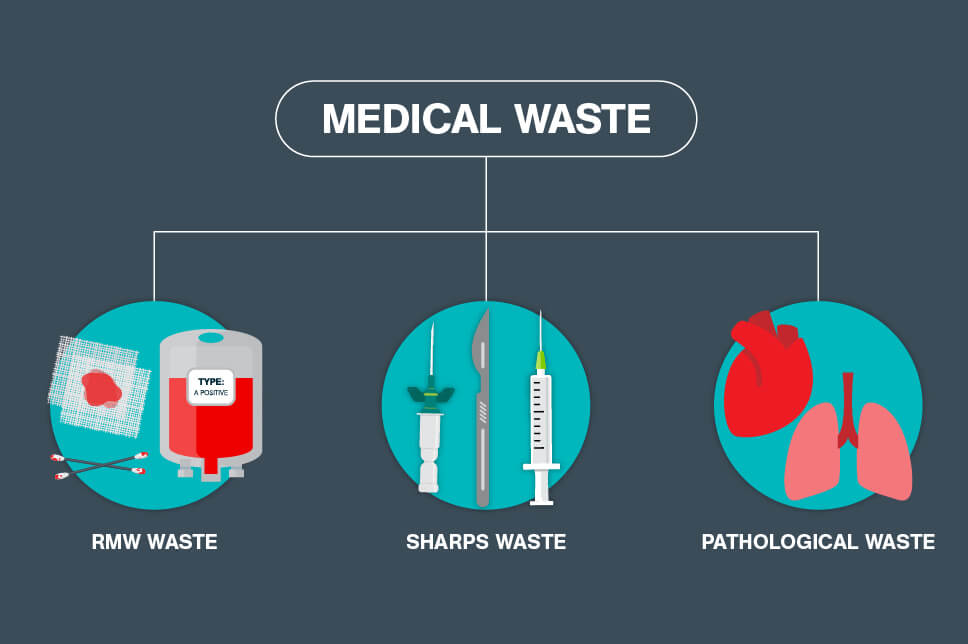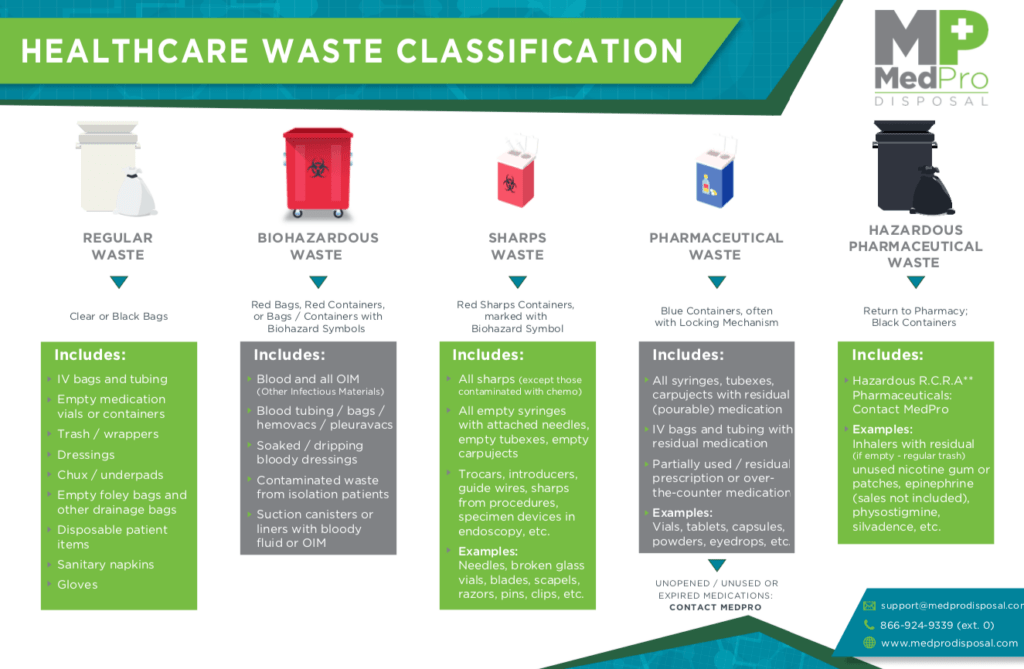Certified and Reliable Medical Waste Removal Service: Partnering for a Cleanser Future
Wiki Article
Proper Disposal Strategies for Medical Waste
Appropriate disposal techniques for medical waste are of utmost value in ensuring the security of both health care workers and the basic public. The proper handling and disposal of clinical waste is important to prevent the spread of transmittable diseases and the contamination of the setting. This intro will certainly explore the value of proper clinical waste disposal, offer guidelines for dealing with various kinds of waste, and emphasize the need for healthcare centers to adopt finest techniques.Value of Appropriate Clinical Waste Disposal
Proper medical waste disposal is of utmost importance in order to avoid the spread of infections and secure public wellness. Medical waste refers to any kind of waste created during medical treatments or from the medical care market. This waste can consist of infectious materials, such as blood or bodily liquids, sharps, drugs, and various other possibly dangerous compounds. Otherwise disposed of properly, clinical waste can present serious threats to healthcare workers, patients, and the basic public.Among the primary reasons for correct clinical waste disposal is to stop the spread of infections. Medical waste can nurture numerous pathogens, consisting of bacteria, viruses, and various other bacteria that can trigger conditions. Improper disposal can result in the contamination of surfaces, water sources, and air, increasing the risk of infections. By securely disposing of medical waste, the possibilities of direct exposure to these pathogens are considerably reduced, guaranteeing the safety of medical care employees, individuals, and the community at big.
Additionally, proper clinical garbage disposal is vital for protecting public health. Clinical waste that is not appropriately managed can infect soil, water bodies, and even food sources. This can lead to the transmission of conditions to humans and animals, presenting a considerable public health risk (WasteX Medical Waste Disposal). By complying with correct disposal strategies, such as partition, treatment, and containment, we can minimize the potential risks linked with clinical waste and guard the wellness of the community.
Handling and Disposing of Sharps
When it comes to the handling and disposal of sharps, adherence to correct procedures is vital for making sure the security of medical care workers and protecting against the threat of injury or infection. Sharps consist of needles, syringes, lancets, and other items with the prospective to puncture or cut the skin. As a result of their possible to transfer bloodborne pathogens, such as HIV and hepatitis B and C, it is important to manage and get rid of of sharps properly.
Disposal of sharps containers need to comply with local laws and guidelines. It is best to make use of licensed clinical waste disposal services that specialize in the correct handling and disposal of sharps to guarantee conformity with policies and lessen dangers to medical care workers and the setting.
Guidelines for Transmittable Garbage Disposal
Health care centers should stick to strict guidelines for the disposal of infectious waste to avoid the spread of virus and shield public health. Contagious waste, also referred to as biohazardous or biomedical waste, describes materials that are potentially contaminated with transmittable agents or various other unsafe materials. These products consist of blood-soaked bandages, used handwear covers, specimens, and cultures. Proper disposal of transmittable waste is crucial to ensure the security and wellness of health care employees, individuals, and the public.The guidelines for contagious waste disposal differ depending on the nation and neighborhood laws, yet there are some usual methods that health care facilities ought to follow. Firstly, all infectious waste should be set apart from other kinds of waste at the point of generation. This helps stop cross-contamination and makes sure that the waste can be managed properly. Secondly, transmittable waste needs to be stored in leak-proof, puncture-resistant containers that are clearly classified with the biohazard icon. When not in use to lessen the danger of direct exposure, these containers ought to be maintained closed. Contagious waste should be transferred and disposed of by qualified waste administration firms that specialize in taking care of biomedical waste.
It is necessary for medical care facilities to have detailed training programs in area to educate personnel on the appropriate procedures for transmittable waste disposal. This includes training on waste segregation, storage, and taking care of techniques. By adhering to these standards, healthcare centers can successfully take care of infectious waste, decrease the danger of infections, and secure public wellness.
Ideal Practices for Pharmaceutical Waste Disposal
Pharmaceutical waste disposal must constantly be conducted regularly and based on professional guidelines. Proper management of pharmaceutical waste is vital to shield public wellness and the setting. Drugs can posture a significant danger if not thrown click for more info away appropriately, as they might pollute water sources, injury marine life, or perhaps add to the advancement of antibiotic resistance.One of the most effective practices for pharmaceutical waste disposal is to establish a designated collection system within medical care centers. medical waste disposal. This system ought to include different containers for various kinds of pharmaceutical waste, such as ended medications, unused drugs, and polluted materials. These containers need to be plainly classified and situated in conveniently obtainable areas to encourage correct disposal by health care professionals
In addition, it is important to educate healthcare team about the proper handling and disposal of pharmaceutical waste. Educating programs must focus on recognizing different sorts of pharmaceutical waste, recognizing the linked threats, and complying with the appropriate disposal procedures. Routine reminders and updates need to be given to guarantee conformity with disposal standards.
Along with inner practices, medical care facilities need to also develop partnerships with qualified waste administration business. These companies focus on the collection, transport, and disposal of pharmaceutical waste. By dealing with these specialists, healthcare centers can make certain that their pharmaceutical waste is dealt with securely and in compliance with regional laws.
Conformity With Legal Regulations
In order to guarantee conformity with legal policies, it is imperative for health care facilities to abide by proper disposal techniques for clinical waste. Medical waste postures a considerable risk to public health and wellness and the setting, making it critical for medical care centers to get rid of and handle of it according to the law.
Regulative bodies, such as the Occupational Safety And Security and Health Management (OSHA) and the Epa (EPA), have established standards and needs for the proper disposal of medical waste - WasteX Medical Waste Disposal. These guidelines intend to shield healthcare workers, waste administration employees, and the general public from prospective dangers connected with clinical waste

Non-compliance with lawful laws can cause serious repercussions for medical care centers, consisting of fines, legal liabilities, damage to reputation, and potential injury to public wellness. Consequently, it is essential for medical care centers to remain up-to-date with the most recent regulations and continually screen and enhance their waste administration practices.
Final Thought
Sticking to guidelines for managing and disposing of sharps, contagious waste, and pharmaceutical waste is essential. It is crucial that healthcare facilities preserve strict procedures for the correct disposal of clinical waste to minimize dangers and preserve a risk-free health care setting.Medical waste refers to any waste produced throughout clinical treatments or from the health care industry. Infectious waste, likewise understood as biohazardous or biomedical waste, refers to products that are possibly infected with infectious agents or other dangerous compounds. All contagious waste must be segregated from various other types of waste at the point of generation. Contagious waste must be moved and disposed of by licensed waste monitoring firms that specialize in taking care of biomedical waste.
Sticking to standards for getting rid of and dealing with of sharps, transmittable waste, and pharmaceutical waste is crucial. (medical waste disposal service)
Report this wiki page